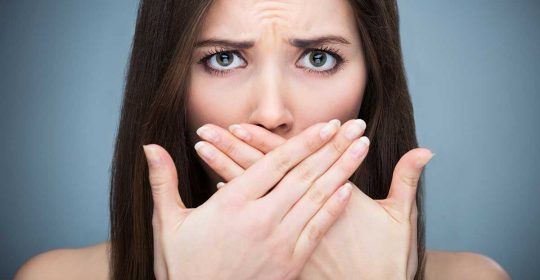Bad Breath: What Causes It and How to Get Rid of It


Bad breath, or halitosis, is characterised by an unpleasant odour of the mouth.
Did you know as many as 50% of people suffer from bad breath?
Many people don’t realise how common it is. Symptoms of bad breath include unpleasant odour or taste in the mouth, dry mouth, or white coating on the tongue.
What Can Cause Bad Breath?
Today, gut health is a hot topic in healthcare. Researchers are now finding that nearly every chronic disease has a common source in digestive imbalance. Your mouth and gums are a living and accessible part of a healthy gut. Bad breath could be a sign that you suffer from conditions of the digestive tract.
The most common cause of bad breath begins in the mouth. Did you know that the environment in your mouth (oral microbiome) has probiotic species that protect against diseases such as tooth decay and gum disease? There are also bugs that help to protect against imbalances that cause bad breath.
However, beyond the mouth, there are some serious diseases like liver failure, lung infections, and cancer can cause bad breath. Some of the most persistent types of bad breath may be due to an underlying health problem elsewhere in the body.
How Can I Get Rid of Bad Breath?
Our top tips for getting rid of bad breath:
Practice good dental hygiene
According to research studies, poor dental hygiene is the most common cause of bad breath. Preventing plaque build-up is the key to maintaining a healthy mouth. You should brush your teeth using a fluoride toothpaste for two minutes at least twice per day (morning and night). Also include cleaning between your teeth using floss, proximal cleaners like picksters or a water pik device.
Plenty of H20
Research shows that mouth dryness often causes bad breath. Saliva plays a very important role in keeping your mouth clean. Without it, bacteria thrive.
Your mouth naturally dries out while you sleep, which is why breath is typically worse in the morning.
Prevent dry mouth by keeping your body hydrated. Drinking water (not caffeinated or sugary drinks) throughout the day will help encourage saliva production. Aim for at least eight glasses of water per day.
Scrape your tongue
The coating that normally forms on your tongue can be a host for smelly bacteria. To get rid of them, gently brush your tongue with your toothbrush or a dedicated tongue cleaner.
Avoid foods that sour your breath
Onions and garlic are big offenders, when it comes to bad breath. But brushing after you eat them doesn’t help. The best way to stop the problem? Don’t eat them, or at least avoid them before you go to work or see friends.
Stop smoking
Besides causing cancer, smoking can damage your gums, stain your teeth, and give you bad breath. Over-the-counter nicotine patches can help tame the urge. If you need a little help, make an appointment with your doctor to talk about quit-smoking programs or prescription medications that can help you give up tobacco for good.
Visit your dentist regularly
Regular check-ups with your dentist will help to keep your gums and teeth healthy and well and decrease the likelihood of suffering from bad breath. If your bad breath isn’t improving with home treatment, please consult your dentist.
What is the prognosis for people with halitosis and bad breath?
Most of the time, bad breath can be cured and prevented with proper oral hygiene. It is rarely life-threatening, and the prognosis is good. However, bad breath may be a complication of a medical disorder that needs to be treated.
If you or a family member suffer from bad breath, it is advised to visit a dentist who can assess your mouth and provide recommended solutions.
The caring and professional dentists located in Adelaide and Brighton at Dental Care Professionals are here to help, contact us today. Call 8232 3280.



